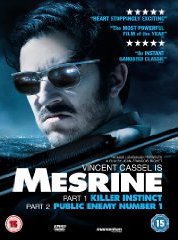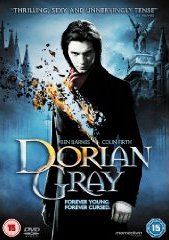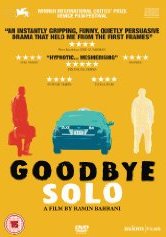Our February DVD releases are light on stars, heavy on variety. We range from the Amazon rain forest to female wrestling and killer futons (we're not joking) in Japan and clandestine video reportage in Burma; from Pushkin’s Russia to Darwin’s England and the French criminal underworld. The Americans are under siege in love and war. Our DVD of the Month finds Britain's Sam Mendes taking a quizzical look at the all-American dream. Peter Watkins's Privilege, exhumed from the Age of Aquarius, is the selected re-release. And our reluctant choice of turkey is the thriller that caught Bertrand Tavernier between two movie cultures. This month’s reviewers are Anne Billson, Tom Birchenough, Alexandra Coghlan, Sheila Johnston, Jasper Rees, Adam Sweeting and Matt Wolf.
Films we have reviewed on their cinematic release are considered in brief, including the outstanding British production of the past year, Andrea Arnold's Fish Tank. In each case there’s a link to read the original review. As ever, click to buy the DVDs on Amazon.
DVD of the Month
 Away We Go, dir. Sam Mendes(E1 Entertainment)
Away We Go, dir. Sam Mendes(E1 Entertainment)
By Matt Wolf
Sam Mendes's fifth movie could be called American Beauty? in the quizzical look it takes at love - and the American landscape - in what is this Oscar winner's quirkiest, most offbeat celluloid offering to date. Theatre people may well regard the film as a companion piece a decade-plus on from Mendes's own London stage revival of Company, the Stephen Sondheim musical set on the 35th birthday of a Manhattan bachelor who is forced to ask himself what it might all mean.
Here, such questions are posed by an itinerant, unmarried young couple who hit the road in order to figure out where, and how, to raise a family before concluding that they might be better off simply with one another, and to hell with society. That, in turn, makes Away We Go the antithesis of Mendes's previous, far less satisfying Revolutionary Road, in which a married couple pretty well implodes in one another's presence whereas, in this film, Verona (Maya Rudolph) and Burt (John Krasinski) find in their union a safe, secure haven.
Rudolph and Krasinski aren't the usual mega-stars found in Mendes's screen work, which tends toward the Oscar bait provided over time by Kevin Spacey, Paul Newman, Kate Winslet and the like. Dark-featured with unruly curls that make her look like a candidate for a revival of the musical Hair, Rudolph makes an immediately winning and attractive presence, and she is well-matched with the ever-so-faintly nebbishy Krasinski, who's given more room to shine here than in his role as essentially a human prop in It's Complicated.
The others who pop up briefly only to send Verona and Burt scurrying include Maggie Gyllenhaal, Chris Messina, Jeff Daniels, and a surprisingly shrill Alison Janney (an American Beauty alumna), none of whom seem the sorts of friends or relatives you might want as neighbours. In the end, our central couple opts for a shared solitude, away from the hurlyburly: precisely the sort of life that Mendes and his wife, Winslet, are denied by dint of their A-list careers. The film, at once flawed but fascinating and on occasion very moving, is both a road movie in the ongoing American tradition and, just possibly, a vision of the life its director at this point simply cannot lead. Find Away We Go on Amazon
 Taking Chance, dir. Ross Katz (HBO Home Entertainment)
Taking Chance, dir. Ross Katz (HBO Home Entertainment)
By Adam Sweeting
With its unambiguous reverence for patriotism, duty and service, this is a film that would never have been made in Britain. Producer-turned-director Ross Katz took as his text the real-life journal of Lt Col Michael Strobl of the US Marines, a veteran of the 1991 Desert Storm campaign now in an administrative job back in the States. Married with young children, Strobl (played by Kevin Bacon) opted not to volunteer for active service in the second Gulf War (the story takes place in 2004), and found himself gnawed with guilt. Poring morbidly over casualty lists, he was struck by the name of PFC Chance Phelps, who happened to come from his own home town in Colorado. He volunteered to accompany Phelps's body back to Wyoming, where his parents now lived, for burial.
The film is a record of the progress of Phelps's flag-draped casket across the USA, by air and road, and the reactions it provokes in the cross-section of Americans who witness it. One sceptical critic commented that the depiction of the meticulous washing and preparation of the bloodied, battle-stained body was "as if Magdalene were washing the wounds of Christ", an impression heightened by the way Katz meticulously avoids showing Phelps's face or physical injuries. The journey itself is structured like the Stations of the Cross.
At the airport check-in, the desk clerk upgrades Strobl to First Class and whispers "thank you for your service". While in flight, a stewardess quietly presses a small crucifix into Strobl's hand. As Phelps's body is lowered out of the aircraft onto the tarmac and Strobl performs a slow, meticulous salute, airport workers gather silently round in prayerful tribute. When he has to stay overnight in Minneapolis, the stoical Strobl spends the night in an airport cargo hangar next to the body rather than in his pre-booked hotel, since he won't leave the body unattended. Ground staff provide him with sleeping bag and blankets. The only character who breaks ranks is a stroppy airport security guard who commands Strobl to take off his medal-bedecked tunic, but Strobl faces him down with a display of cold Marine steeliness. Indeed, Bacon's performance is an epic of lockjawed self-discipline, with only the occasional glimpse of a tear to suggest the hurt within.
The litany of quiet tributes often brings a lump to the throat, and the reminiscences of Phelps's family and friends gathered for the funeral generate sorrow and pity for a young life brutally sawn off, but the sombre pacing and unrelenting air of piety eventually leave you yearning for a change of gear. The US military, previously super-sensitive to media coverage of coffins and casualties, cooperated wholeheartedly with the film-makers, and consequently the piece begins to a resemble a promotional tool hymning the glories and traditions of the US armed forces. John Wayne, one imagines, would have wept buckets. Find Taking Chance on Amazon
 Burma VJ, dir. Andres Ostergaard (Dogwoof)
Burma VJ, dir. Andres Ostergaard (Dogwoof)
By Sheila Johnston
Modern telecommunications have transformed the face of samizdat protest. Gone are the days of dog-earred pamphlets produced on underground printing presses and slowly disseminated to handfuls of the faithful. Today, journalists and citizen journalists are ingenious in employing all the international technology at their disposal, from Google Chat, Facebook, Twitter and YouTube to satellite broadcasts. The voices of dissidence can be heard everywhere, almost instantaneously.
These voices were heard in the internet campaign against Mahmoud Ahmadinejad after Iran's contested elections last summer, and once again this week in the wake of Thursday's anti-government protests in Tehran. They are also raised in this remarkable and courageous documentary, which was nominated for an Oscar last week. Shot by a small cluster of "VJs", or video journalists living within one of the most isolated, secretive and repressive countries in the world, the film records the grassroots protest of August-September 2007 against the military junta which has controlled Myanmar for decades.
Buddhist monks put aside their pacifist convictions to lead the demonstrations, which ended, inevitably, in violence; the rough, raw footage snatched by the VJs on their smuggled camcorders charts a tragic roller-coaster ride from hope, exhilaration and defiance to anxiety and eventually despair. It was the only evidence to seep through to the outside world.
The shooting was spearheaded by "Joshua", a Burmese journalist now living in exile; asked why he and others risked their lives, he says, with tremendously touching humility, "If we want to be free, we have to do something. Everybody is saying, ‘You know, they want democracy but do nothing.' I want it so, so I fight for it. That's all.". The fragments of grainy, shaky footage, shot by many different hands, are assembled, in a magisterial editing job, by Ostergaard, a Danish director; the voice-over narration by "Joshua" and staged reconstructions of linking events, in the manner of Man on Wire, help make sense of the jigsaw. It's a minor masterpiece of agit-prop cinema. Find Burma VJ on Amazon
 Mesrine: Killer Instinct/Public Enemy No. 1 dir. Jean-François Richet (Momentum)
Mesrine: Killer Instinct/Public Enemy No. 1 dir. Jean-François Richet (Momentum)
By Alexandra Coghlan
"What is the difference between a revolutionary and a gangster?" Personal hygiene and taste in facial hair aside, it’s something of a moot question, and one that forms the conceptual riff underpinning the frenzied prison-breaks, bar brawls and bank-raids of Richet’s two-part cinematic biopic Mesrine. A legend in his native France – in 1978 he was unaccountably voted most popular public figure, beating among others Princess Grace of Monaco – Jacques Mesrine has somehow failed to join the likes of Al Capone and John Dillinger in the most-wanted list of international memory. This César-laden diptych could change all that.
Anyone disappointed by the blunt trauma that was Michael Mann’s Public Enemies will delight in this rather keener-edged take on the gangster flick. Starring Vincent Cassel, veteran of La Haine and Irreversible, and directed by Richet whose anti-establishment credentials were cemented by films such as Ma 6-T va crack-er, Mesrine was never going to pull any punches. Balancing Mesrine’s litany of violence – including some rather heavy scenes of domestic abuse – with moments of his legendary charm and charisma, a man emerges who is fatally glamorous, but never actively glamorised – a delicate feat indeed.
Mesrine is not without its flaws. Killer Instinct, charting the early years, is relentlessly episodic, sacrificing narrative arc to a repetitive ritual – crime, imprisonment, escape, seduction – that eventually tries the patience, despite some wonderful set-pieces. Public Enemy No 1 is an altogether more mature film, developing the psychology of its self-mythologising anti-hero, and featuring the considerable talents of Ludivine Sagnier (inevitably as Sylvia, resident eye-candy) and the marvellous Mathieu Amalric as Besse, Mesrine’s most inscrutable accomplice. The dialogue of Mesrine – and indeed Mesrine’s own self-penned account of his life L’instinct de mort – is littered with political references; the causes of the Red Brigade, PLF, FLQ, and the soixante-huitaires, are all repeatedly invoked by a man who remained politically unaffiliated throughout his career. It is this aberration, this bizarrely self-conscious absence that forms the compelling heart of Mesrine’s character. That Richet makes no attempt to supplement or explain this lack is both his films’ greatest strength, and their weakness. Find Mesrine on Amazon
 Broken Embraces, dir. Pedro Almodóvar (Twentieth Century Fox Home Entertainment)
Broken Embraces, dir. Pedro Almodóvar (Twentieth Century Fox Home Entertainment)
By Alexandra Coghlan
A table covered in the bright debris of hundreds of torn-up photographs; a revolving metal sculpture, all spheres and circles; a blind man running his hands over a grainy image frozen on a television screen: if you were to watch Almodóvar's Broken Embraces without sound you would come away totally satisfied – gorged on the montage of characteristically extravagant imagery. Add dialogue and a densely wrought plot and the result is a beautiful, fragile film, oddly insubstantial despite a self-conscious excess of layers.
Returning to Almodóvar’s noir mode, Broken Embraces tells the story of blind film-maker Mateo (Lluís Homar) and the doomed project Girls and Suitcases on which he meets and falls for Lena (Penélope Cruz), mistress of controlling financier Ernesto Martel (José Luis Gómez). Split across a 10-year gap, the film’s double narrative switches restlessly back and forth – a fractured collage of episode and encounters that expose familiar Almodóvar themes: filial relationships, the nature of intimacy, a search for identity. Densely referential and self-reflexive, Broken Embraces is a homage to the art and artifice of cinema itself. “Before I went into film I was very good at telling stories,” declares Mateo, wryly. This film finds Almodóvar proving that, after 30 years in cinema, he still knows how to spin an elegant yarn. Find Broken Embraces on Amazon
 Shinjuku Boys/ Gaea Girls, dir. Kim Longinotto/ Jano Williams (Second Run)
Shinjuku Boys/ Gaea Girls, dir. Kim Longinotto/ Jano Williams (Second Run)
By Tom Birchenough
The final two of the five films Kim Longinotto made with collaborator Jano Williams in Japan in the 1990s join her Iranian double (Divorce Iranian Style and Runaway) on the Second Run label, which deserves kudos for bringing such quality documentary fare back on to the shelf. Gaea Girls (2000) is the weightier one in every sense: in length, at close on 100 minutes, and in subject – the world of women’s professional wrestling, and the story of those who vie for admission into, and domination of that exclusive industry. Outside the ring, initiates at the school out in the country seem the quietest, most respectful characters. Inside, they’re thrown around in a sport that appears to have very few rules; miraculously, injury is rare – as are any revelations of their inner lives, including sexual ones. Trainer momma Nagayo steals the show, especially with her own 11th-hour personal narrative; her brand of tough love doesn’t come much tougher – “Lots of people suffer in new jobs,” she consoles one initiate. It's just that this one involves being flung about the ring and stamped on.
Shinjuku Boys (1995) doesn’t have such muscle. Its three heroines/heroes are onnabes, women dressed as men who work as hosts for women clients in a Tokyo club, New Marilyn. Sexual identities are in all sorts of flux, but there seems surprisingly little trauma in the wider picture. This is very much an interior film, with the club itself depicted as exotic, soft in colour and focus, and there’s a high ratio of characters speaking about themselves on screen (in Gaea Girls, that’s minimal). They’ve got plenty to say, about sex, partners and prospects. The shorter format of barely 50 minutes is a welcome cut-down on bulk, too. No extras, sadly – so no chance to hear how the films’ characters (and, more generally, the issues raised) are doing a decade or more later. Find Shinjuku Boys/ Gaea Girls on Amazon
 (500) Days of Summer, dir. Marc Webb (Twentieth Century Fox Home Entertainment)
(500) Days of Summer, dir. Marc Webb (Twentieth Century Fox Home Entertainment)
By Jasper Rees
This is not a love story, advises the voice-over. When a film that has all the trappings and trimmings of a romantic comedy makes such an assertion, it’s as well to treat it with scepticism. And yet (500) Days of Summer is a tidy subversion of trad date-movie expectations, in which boy meets girl, boy loses girl, etc. Whether boy gets girl back turns out to be a rather more interesting question this time round. The boy (personably played by Joseph Gordon-Levitt) is head over heels with Summer (Zooey Deschanel), a toothsome co-worker at a greetings card company who can kind of take him or leave him. Like an unreconstructed young buck, she’s the one who for whatever reason doesn’t do commitment. The narrative flits back and forth across its eponymous 500 days somewhat in the style of Sliding Doors, pleasantly treading the line between knowingness and sweetness. It may hang on your worldview, not to mention your gender, but the question arises: do you even want him to get the girl? As coolly played by Deschanel, Summer is either a diabolical tease or a messenger sent to inform all the young dudes that they ought to try to love women a little less and understand them a little more. The scene where she lists her variously enviable exes is pure theatre of cruelty. Either way, maybe don’t nestle in to watch it with the one you love. You may love them a little less by the end. And, of course, they you. Find (500) Days of Summer on Amazon
 House, dir Nobuhiko Obayashi (Eureka Entertainment Masters of Cinema series)
House, dir Nobuhiko Obayashi (Eureka Entertainment Masters of Cinema series)
By Anne Billson
Nobuhiko Obayashi's legendary haunted house movie, also known as Hausu, was first released in Japan in 1977. It finally gets a DVD release in the UK and, I'm happy to report, proves to be even more bonkers than its reputation suggested. Oshare, miffed at her dad for having invited his girlfriend on holiday with them, decides instead to visit her aunt, who lives in a house in the country, and brings six of her classmates along. From the outset, the story is told in a riot of lurid hues and backdrops, with flashbacks styled like silent movie inserts and a jaunty soundtrack which wouldn't have been out of place in German softcore porn from the 1970s.
Of course, once they get to their destination, there turns out to be more to the aunt and her malevolent white cat than meets the eye, and the girls succumb, one by one, to terrible fates. One is attacked by futons. Another is bitten on the bum by a severed head. Yet another is eaten by a piano, while a fourth is swallowed by a lampshade. Such horrible deaths, with severed limbs aplenty, might have been be ultra-gory and unpleasant in realistic modern CGI, but the special effects in House are every bit as mad as the story - lots of crazy zooms, wacky animation and what looks suspiciously like someone scribbling on the film with a fluorescent felt-tip.
The overall effect is a bit like Suspiria crossed with Tears of the Black Tiger, but a lot stranger and funnier than either. There's even a bit of gratuitous schoolgirl nudity and panty-sniffing. It's all so bizarre and stylised that it's impossible to care about the characters (probably just as well, since they come to such baroque sticky ends) though I did develop a soft spot for a feisty girl nicknamed "Kung-Fu". Obligatory viewing for lovers of the kitsch, the cool and the crazy, but be warned - don't watch it under the influence of hallucinogenic drugs, or your head will explode. Official Site. Find House on Amazon
In brief
 Dorian Gray, dir. Oliver Parker (Momentum)
Dorian Gray, dir. Oliver Parker (Momentum)
Oliver Parker’s film account of the Narcissus with a rotting portrait locked in his loft is his third visit to Wilde’s shores. Here he ramps up the gothic and soft porn at the expense of the book's languid wit. Colin Firth has fun playing 60. “Make life burn with the hardest flame,” drawls his Lord Henry Wotton, leading the wide-eyed Dorian into a netherworld of gin and tarts. A squeaky clean Ben Barnes gets to do all the humping and bumping, the chopping and lopping, but something of the character’s heartlessness has eaten out the film’s core from the inside like the maggots who infest the portrait, leaving behind a polished teak surface. The boy Gray is a grey boy. (JR) Find Dorian Gray on Amazon. Read the original review on theartsdesk.
 Army of Crime, dir. Robert Guédiguian (Optimum)
Army of Crime, dir. Robert Guédiguian (Optimum)
Second World War thriller centred on the real-life figure of Missak Manouchian, a poet of Armenian descent who reluctantly agrees to head up a cell of Resistance fighters. Half-German and half-Armenian, Guédiguian is in an extraordinary position to illuminate this material, and so the dull result comes as an especial disappointment. Notable nonetheless for capturing the multi-cultural composition of the maquis, and for its rich mix of sound archive material. (SJ) Find Army Of Crime on Amazon. Read the original review on theartsdesk.
 Up, dirs. Pete Docter, Bob Peterson (Walt Disney)
Up, dirs. Pete Docter, Bob Peterson (Walt Disney)
Mr Fredricksen has a hearing aid, false teeth, a walker and a stairlift that's on the blink, but Pixar's graceful and affecting comedy, deservingly Oscar-nominated for Best Picture, explores the youthful dreams and romance behind the old-man mask of wrinkles and big black specs. Despite his advanced years, a daring South American adventure is on Mr F's mind and an eager, spherical boy-scout tags along for the ride. The central section sags into a generic thrill-ride, but the glorious visual invention and big-hearted characters leave you on a high. (SJ) Find Up on Amazon. Read the original review on theartsdesk.
 Fish Tank, dir. Andrea Arnold (Artificial Eye)
Fish Tank, dir. Andrea Arnold (Artificial Eye)
Mia, a loud-mouthed 15-year-old fizzing with spit and vinegar (played by the electrifying newcomer Katie Jarvis), dreams of escaping from her shabby Essex housing estate through a passion for dance. And her mother's likeable, hunky new Irish boyfriend (Michael Fassbender) seems just the man to help her to stardom. Nothing as trite as that happens, fortunately. But, while Arnold's world seems at first unforgiving, she infuses it with a thrilling energy that takes the film into another dimension. (SJ) Find Fish Tank on Amazon. Read the original review on theartsdesk.
 The Queen of Spades, dir. Thorold Dickenson (Optimum)
The Queen of Spades, dir. Thorold Dickenson (Optimum)
Last summer, when Radio 4 ran a poll to find the most sought-after but unavailable film, The Queen of Spades won hands-down. Now this eerie 1949 adaptation of Alexander Pushkin's ghost story finally makes its long-overdue bow on DVD. Anton Walbrook is the poor but greedy Russian gambler, Edith Sitwell the withered beldame who holds the secret of winning at cards. The extras on the disc are great too, including a brief but passionate introduction by Martin Scorsese and a couple of fascinating sound recordings of Dickenson himself. (SJ) Find The Queen of Spades on Amazon. Read the original review on theartsdesk.
 Birdwatchers, dir. Marco Bechis (Artificial Eye)
Birdwatchers, dir. Marco Bechis (Artificial Eye)
In the Mato Grosso of south-western Brazil, the Guarani tribe, its traditional hunting grounds despoiled by intensive farming, is facing extinction. With the mission to draw attention to their plight, Birdwatchers pivots on the stark, ill-starred confrontation between the Guarani and local white ranchers and tourist operators. It's fierce, compelling stuff, punched home with some memorable characters and soaringly beautiful choral music. (SJ) Find Birdwatchers on Amazon. Read the original review on theartsdesk.
 Goodbye Solo, dir. Ramin Bahrani (Axiom)
Goodbye Solo, dir. Ramin Bahrani (Axiom)
Set against the shabby poetry of Winston-Salem, North Carolina, Goodbye Solo tells the touching, quietly troubling story of a suicidal man and the African taxi driver he hires to take him on his last trip. Bahrani, who also made Man Push Cart, is fast proving one of the American cinema's great humanist directors and his film is brilliantly cast with two non-professionals, Souléymane Sy Savané, a French-African fashion model, and Red West, a battered stuntman, whose faces are engrained with personality and life experience. (SJ) Find Goodbye Solo on Amazon. Read the original review on theartsdesk.
 Creation, dir. Jon Amiel (Icon)
Creation, dir. Jon Amiel (Icon)
The life of the mind makes for leaden cinema in Jon Amiel's contribution to the recent immersion in Charles Darwin, to coincide with the bicentenary of the scientist's birth. Paul Bettany plays the evolutionary pioneer, with lots of hunching over books and the odd breakout of sweat as and when necessary to up the emotive stakes. His real-life wife, Jennifer Connelly, is on hand as Mrs Darwin, aka Emma, sporting a burdensome British accent and, on this evidence, preferring a quick read of On the Origin of Species to one more romp in the hay: there's true devotion for you. (MW) Find Creation on Amazon. Read the original review on theartsdesk.
 Mr Right, dirs. David and Jacqui Morris (Verve)
Mr Right, dirs. David and Jacqui Morris (Verve)
Soho (London's version, not New York's) looks great, shame about the rest, in a dreary gay-themed indie that proves nothing more than that films made for pennies and out of a sense of love can be every bit as hollow and self-absorbed as the most bloated Hollywood blockbuster. The brother-sister team of David and Jacqui Morris give us a tangled weave of libidos on parade, each more morose and solipsistic than the next. Luke de Woolfson is sweet enough as the movie's de facto Dante, and Rocky Marshall has his moments, too. For the rest, avoid - or head for the theatre, which covers such terrain infinitely better. (MW) Find Mr Right on Amazon. Read the original review on theartsdesk.
Re-release of the Month
 Privilege, dir. Peter Watkins (BFI Flipside)
Privilege, dir. Peter Watkins (BFI Flipside)
By Adam Sweeting
As the excellent essays accompanying this BFI Flipside DVD release remind us, Peter Watkins's best-remembered pieces are Culloden (1964) and The War Game (1965), where he deployed daring pseudo-documentary techniques to examine the 1746 massacre of the Scottish clans and the consequences of a nuclear attack on Britain respectively. The latter was deemed too horrific to broadcast by the BBC.
In 1967 Watkins made Privilege, about a pop icon used as a tool of social control by politicians and assorted forces of reaction. His premonition of a suffocating, control-freak society now seems unpleasantly prescient, but where Watkins had displayed a formidable grip of news and documentary techniques, and how to bend them to his own ends, he was less convincing when he tried to work within the more entertainment-orientated demands of fictional characters and dramatic narrative.
Many of his problems began with the casting. As his protagonist Steven Shorter, Paul Jones (formerly the singer with Manfred Mann) is photogenic but exasperatingly vacant. Much the same goes for then-supermodel Jean Shrimpton as Vanessa Ritchie, who spends most of the film trying listlessly to paint a portrait of Shorter while trying to understand his anger against the cage in which his grotesque handlers have trapped him. These include his music publisher Julie Jordan (played by Max Bacon as a clunking Tin Pan Alley stereotype), slimy publicist Alvin Kirsch (Mark London) and cold-blooded banker Andrew Butler (William Job). Only the director's own caustic voice-over deserves plaudits.
The plot stretches itself pretty thin, too. The notion that an insecure coalition government would be obsessed with suppressing “the violence of youth” by serving up state-sponsored pop singers as a sort of performing safety-valve is not entirely unbelievable (is it that far removed from Simon Cowell and X Factor, ostentatiously admired by our Prime Minister?), but the presentation is crude and schematic. When the politicians then team up with the dignitaries of the Church of England to turn Shorter into a weapon to promote “a fruitful conformity” among the teeming proletariat, and stadium-sized audiences dutifully chant “we will conform”, the improbable becomes ludicrous.
The fact that Shorter’s music is tepid mush, performed by a one-dimensional wimp on the verge of a nervous breakdown, saws the remaining floorboards out from under the drama. But maybe Norman Jewison gleaned a few hints from Privilege when he made Rollerball, a more sophisticated take on the idea of using mass entertainment to pacify the citizenry. Find Privilege on Amazon.
Stinker of the Month
 In the Electric Mist, dir. Bertrand Tavernier(High Flyers)
In the Electric Mist, dir. Bertrand Tavernier(High Flyers)
By Sheila Johnston
Perhaps it's not altogether fair to call this a stinker. Perhaps it's more of an oddly perfumed curio. But a miasma of ambiguity certainly hovers over the swampy Louisiana landscapes of In The Electric Mist. It's based on a best-selling thriller, one of a successful series, by James Lee Burke. It has a good title (the book's title is even better: In the Electric Mist with Confederate Dead). There's a mouth-watering cast: Tommy Lee Jones, John Goodwin, Ned Beatty, Mary Steenburgen, Peter Sarsgaard, Kelly Macdonald, John Sayles and two musicians, Levon Helm and Buddy Guy - and that's just to name a few.
The director is a distinguished critic, a connoisseur of American cinema, on which he has published two major books, and a film-maker of international renown. Tavernier is French but speaks immaculate English and has worked in the language often; he has already shot a film, Mississippi Blues (1984), in the Deep South. He spent a good deal of time with Burke, who co-wrote the script. So the result shouldn't be yet another case of a European director who comes to grief in America; it should, on the contrary, be sensational. Yet this murder mystery is a frightful mess. Characters flicker like shadows, the dialogue is banal and the story makes no sense at all. What's going on?
Clue: the review copy I received is significantly shorter than the 117-minute cut that was premiered at the Berlin Film Festival last year. This odd state of affairs was the result of a high-profile row between Tavernier and his American producer, Michael Fitzgerald, which resulted in two different versions, Tavernier's cut and a 102-minute one prepared by Fitzgerald for American release, which was not only re-edited but which also contained a number of different scenes.
In an interview last year for Cineaste magazine, the director declared himself "absolutely happy" with the arrangement and said his own version would be released worldwide outside America (and would be available there on DVD). Nonetheless, here in Britain we've got Fitzgerald's one (compressed to 98 minutes in the PAL transfer). No wonder the narrative has so many loose ends.
Jones plays a cop, Dave Robicheaux, a recovering alcoholic who's rather fond of beating up suspects and planting evidence but is, we are meant to gather, at heart an honourable man. He's investigating the murder and butchering of a young prostitute, a case that comes to seem mysteriously linked to the killing of a black escaped convict over 40 years ago. In the course of his enquiries, Robicheaux meets the local mob boss (Goodwin, delectably sleazy), the dubious director of a film being shot in the area and apparently bankrolled with laundered dough (Sayles), its hard-drinking star (Sarsgaard) and his girlfriend (Macdonald), a captain of industry (Beatty) and diverse corrupt cops and old-timers, the oldest-timer of which is a bearded General from the Civil War (Helm). This cove, either a ghost or a figment of Robicheaux's imagination, pops up at intervals to croak out nuggets of impenetrable wisdom and, one assumes, to be a symbol of the way the Deep South is still haunted by its racist past (the book, written in 1993, has been updated to the present day in order to throw the devastation left by Hurricane Katrina into the mix).
It might all make more sense if you know the novel - even though it, as it turns out, is the sixth in a series, so ideally you'd need to read the five previous books to get a sense of all the characters' complicated back-stories. It's quite an achievement, really, given the calibre of cast, but in the film none of these colourful figures is given space to breathe and come alive. I haven't been able yet to view Tavernier's cut, though I gather from the reviews in Berlin that it was less jam-packed with chaotic incident and more leisurely, stronger on atmosphere, prepared to linger on scenes that flesh out the characters rather than relentlessly pushing forward the plot. In short, more European, less American. If this interests you, you can buy Tavernier's cut (in English with French subtitles) on French Amazon. I rather fancy that Dans la brume électrique might not smell so bad at all. Find In the Electric Mist (English version) on Amazon.















Add comment